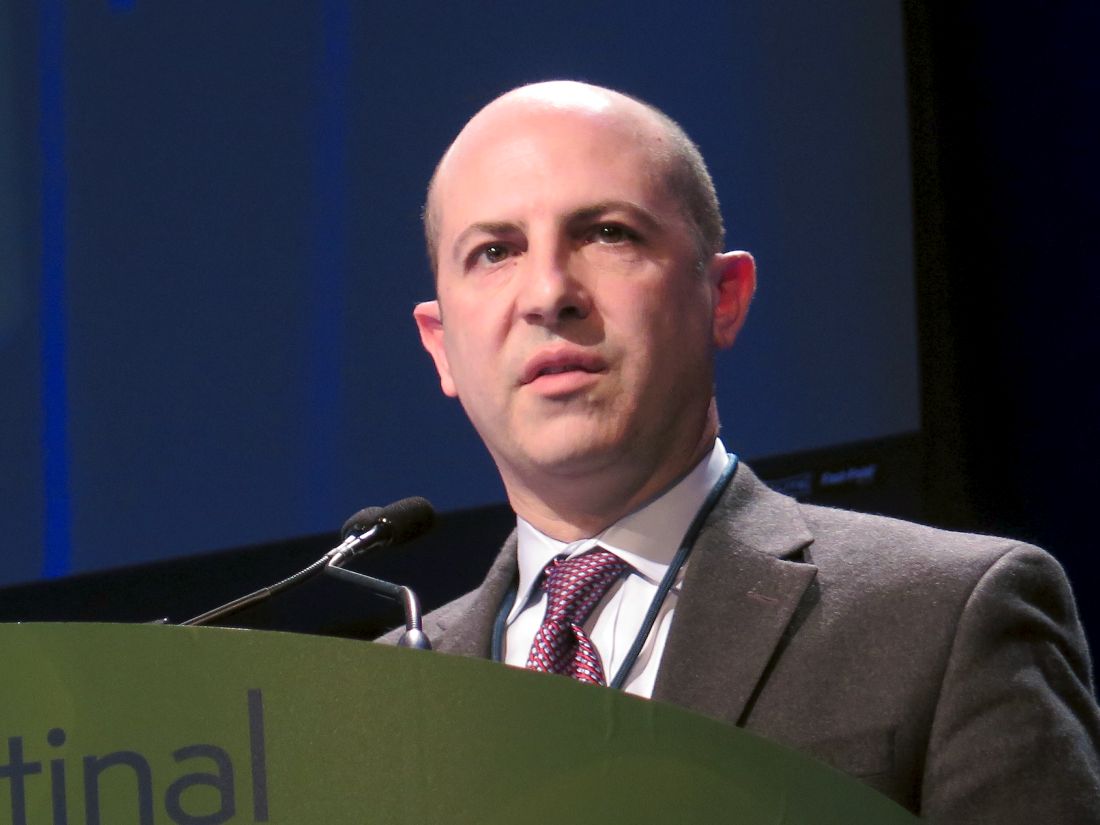User login
SAN FRANCISCO – Simultaneously targeting two components of the same signaling pathway in BRAF V600E–mutated biliary tract cancer is a winning strategy, suggests an analysis of the multicenter phase 2 ROAR basket trial.
“Recently, a number of genetic targets have been identified with distinct rates of frequency in intrahepatic, extrahepatic, and gallbladder cancer that are the subject of a number of ongoing clinical trials. In retrospective studies, mutations in BRAF have been identified in about 5%-7% of patients, predominantly in the intrahepatic cohort,” lead investigator Zev A. Wainberg, MD, noted at the 2019 GI Cancers Symposium. Previous research has shown combined inhibition of BRAF and MEK – two sequential proteins on the MAP kinase signaling pathway – to be efficacious in BRAF V600E–mutated melanoma, non–small cell lung cancer, and anaplastic thyroid cancer.
In the ROAR trial, 178 patients with advanced or metastatic BRAF V600E–mutated rare cancers who had exhausted standard treatment options were treated with the combination of the BRAF inhibitor dabrafenib (Tafinlar) and the MEK inhibitor trametinib (Mekinist). Dr. Wainberg reported results for the 35 patients having biliary tract cancer, most of whom were heavily pretreated.
With a median duration of follow-up of 8 months, the overall response rate was 42% as assessed by investigators and 36% as assessed by independent reviewers. More than half of patients had a grade 3 or 4 adverse event, but just one had to permanently stop treatment because of toxicity.
“These results represent the first prospectively analyzed cohort of patients with BRAF V600E–mutated biliary tract cancers treated with the combination of BRAF and MEK inhibition. Efficacy in this patient population with advanced disease was comparable to that of first-line chemotherapy with gemcitabine and cisplatin,” pointed out Dr. Wainberg, codirector of the GI oncology program and an assistant professor of medicine at the University of California, Los Angeles.
“Dabrafenib and trametinib demonstrated clinical benefit in patients with BRAF-mutant biliary tract cancers and should be considered a meaningful therapeutic option for these patients,” he contended. “BRAF V600E is one of several actionable driver mutations in this disease and should be considered for routine testing in patients with biliary tract cancers. In addition, among all the other data [that are] emerging in molecular analysis of this malignancy, perhaps among all the GI malignancies, this has the potential to undergo multiple studies of other targeted therapies.”
Why stop there?
“I don’t think there is anything needed to convince you that this treatment is very effective. It’s incredibly impressive,” commented invited discussant Heinz-Josef Lenz, MD, associate director for adult oncology and coleader of the gastrointestinal cancers program, University of Southern California Norris Comprehensive Cancer Center in Los Angeles.
But experience with other BRAF-mutant malignancies, such as BRAF-mutant colorectal cancer, suggests that further benefit can accrue from hitting additional molecular targets, he said. For example, rationally selected triplet combinations can suppress emergence of resistant clones up front.
“How can we do even better? I think we need to be smart in how we inhibit downstream signaling of BRAF-mutant disease,” Dr. Lenz maintained, as downstream targeting is potentially more effective. Therefore, a logical candidate for improving on the combination of BRAF and MEK inhibitors in biliary tract cancer is an ERK inhibitor. Alternatively, the combination may be synergistic when used with immune checkpoint inhibitors that target programmed death-1 or programmed death–ligand 1.
Oncologists should perform next-generation sequencing for all patients with biliary tract cancer, in Dr. Lenz’s opinion. “Biliary cancer is one of these cancers where we have many potentially actionable mutations. I know there is no drug approved, but many trials are ongoing,” he elaborated. “So I just encourage you to do that in order to identify potential trials or treatment options.”
Study details
In the ROAR trial, patients received open-label dabrafenib (150 mg, twice daily) plus trametinib (2 mg, once daily) until unacceptable toxicity, disease progression, or death.
All 35 patients with biliary cancer had received gemcitabine, and 80% had received at least two lines of prior systemic therapy.
The median treatment duration was 6 months, Dr. Wainberg reported at the symposium, sponsored by the American Gastroenterological Association, the American Society for Clinical Oncology, the American Society for Radiation Oncology, and the Society of Surgical Oncology. Fully 86% of patients were on treatment for longer than 3 months.
In addition to the impressive response rates, the patients had a median progression-free survival of 9.2 months, and a median overall survival of 11.7 months.
Adverse events were as expected based on previous experience with these targeted therapies, according to Dr. Wainberg. The rate of grade 3 or 4 adverse events was 57%. “These were predominantly pyrexia, a known side effect of BRAF inhibitors, which is managed with antipyretic therapy and dexamethasone,” he noted. Rash and gastrointestinal toxicity were also common.
Although adverse events often led to dose reductions and dose interruptions, only a single patient (3% of the cohort) had to stop treatment early because of an event (cholangitis).
SOURCE: Wainberg ZA et al. 2019 GI Cancers Symposium, Abstract 187.
SAN FRANCISCO – Simultaneously targeting two components of the same signaling pathway in BRAF V600E–mutated biliary tract cancer is a winning strategy, suggests an analysis of the multicenter phase 2 ROAR basket trial.
“Recently, a number of genetic targets have been identified with distinct rates of frequency in intrahepatic, extrahepatic, and gallbladder cancer that are the subject of a number of ongoing clinical trials. In retrospective studies, mutations in BRAF have been identified in about 5%-7% of patients, predominantly in the intrahepatic cohort,” lead investigator Zev A. Wainberg, MD, noted at the 2019 GI Cancers Symposium. Previous research has shown combined inhibition of BRAF and MEK – two sequential proteins on the MAP kinase signaling pathway – to be efficacious in BRAF V600E–mutated melanoma, non–small cell lung cancer, and anaplastic thyroid cancer.
In the ROAR trial, 178 patients with advanced or metastatic BRAF V600E–mutated rare cancers who had exhausted standard treatment options were treated with the combination of the BRAF inhibitor dabrafenib (Tafinlar) and the MEK inhibitor trametinib (Mekinist). Dr. Wainberg reported results for the 35 patients having biliary tract cancer, most of whom were heavily pretreated.
With a median duration of follow-up of 8 months, the overall response rate was 42% as assessed by investigators and 36% as assessed by independent reviewers. More than half of patients had a grade 3 or 4 adverse event, but just one had to permanently stop treatment because of toxicity.
“These results represent the first prospectively analyzed cohort of patients with BRAF V600E–mutated biliary tract cancers treated with the combination of BRAF and MEK inhibition. Efficacy in this patient population with advanced disease was comparable to that of first-line chemotherapy with gemcitabine and cisplatin,” pointed out Dr. Wainberg, codirector of the GI oncology program and an assistant professor of medicine at the University of California, Los Angeles.
“Dabrafenib and trametinib demonstrated clinical benefit in patients with BRAF-mutant biliary tract cancers and should be considered a meaningful therapeutic option for these patients,” he contended. “BRAF V600E is one of several actionable driver mutations in this disease and should be considered for routine testing in patients with biliary tract cancers. In addition, among all the other data [that are] emerging in molecular analysis of this malignancy, perhaps among all the GI malignancies, this has the potential to undergo multiple studies of other targeted therapies.”
Why stop there?
“I don’t think there is anything needed to convince you that this treatment is very effective. It’s incredibly impressive,” commented invited discussant Heinz-Josef Lenz, MD, associate director for adult oncology and coleader of the gastrointestinal cancers program, University of Southern California Norris Comprehensive Cancer Center in Los Angeles.
But experience with other BRAF-mutant malignancies, such as BRAF-mutant colorectal cancer, suggests that further benefit can accrue from hitting additional molecular targets, he said. For example, rationally selected triplet combinations can suppress emergence of resistant clones up front.
“How can we do even better? I think we need to be smart in how we inhibit downstream signaling of BRAF-mutant disease,” Dr. Lenz maintained, as downstream targeting is potentially more effective. Therefore, a logical candidate for improving on the combination of BRAF and MEK inhibitors in biliary tract cancer is an ERK inhibitor. Alternatively, the combination may be synergistic when used with immune checkpoint inhibitors that target programmed death-1 or programmed death–ligand 1.
Oncologists should perform next-generation sequencing for all patients with biliary tract cancer, in Dr. Lenz’s opinion. “Biliary cancer is one of these cancers where we have many potentially actionable mutations. I know there is no drug approved, but many trials are ongoing,” he elaborated. “So I just encourage you to do that in order to identify potential trials or treatment options.”
Study details
In the ROAR trial, patients received open-label dabrafenib (150 mg, twice daily) plus trametinib (2 mg, once daily) until unacceptable toxicity, disease progression, or death.
All 35 patients with biliary cancer had received gemcitabine, and 80% had received at least two lines of prior systemic therapy.
The median treatment duration was 6 months, Dr. Wainberg reported at the symposium, sponsored by the American Gastroenterological Association, the American Society for Clinical Oncology, the American Society for Radiation Oncology, and the Society of Surgical Oncology. Fully 86% of patients were on treatment for longer than 3 months.
In addition to the impressive response rates, the patients had a median progression-free survival of 9.2 months, and a median overall survival of 11.7 months.
Adverse events were as expected based on previous experience with these targeted therapies, according to Dr. Wainberg. The rate of grade 3 or 4 adverse events was 57%. “These were predominantly pyrexia, a known side effect of BRAF inhibitors, which is managed with antipyretic therapy and dexamethasone,” he noted. Rash and gastrointestinal toxicity were also common.
Although adverse events often led to dose reductions and dose interruptions, only a single patient (3% of the cohort) had to stop treatment early because of an event (cholangitis).
SOURCE: Wainberg ZA et al. 2019 GI Cancers Symposium, Abstract 187.
SAN FRANCISCO – Simultaneously targeting two components of the same signaling pathway in BRAF V600E–mutated biliary tract cancer is a winning strategy, suggests an analysis of the multicenter phase 2 ROAR basket trial.
“Recently, a number of genetic targets have been identified with distinct rates of frequency in intrahepatic, extrahepatic, and gallbladder cancer that are the subject of a number of ongoing clinical trials. In retrospective studies, mutations in BRAF have been identified in about 5%-7% of patients, predominantly in the intrahepatic cohort,” lead investigator Zev A. Wainberg, MD, noted at the 2019 GI Cancers Symposium. Previous research has shown combined inhibition of BRAF and MEK – two sequential proteins on the MAP kinase signaling pathway – to be efficacious in BRAF V600E–mutated melanoma, non–small cell lung cancer, and anaplastic thyroid cancer.
In the ROAR trial, 178 patients with advanced or metastatic BRAF V600E–mutated rare cancers who had exhausted standard treatment options were treated with the combination of the BRAF inhibitor dabrafenib (Tafinlar) and the MEK inhibitor trametinib (Mekinist). Dr. Wainberg reported results for the 35 patients having biliary tract cancer, most of whom were heavily pretreated.
With a median duration of follow-up of 8 months, the overall response rate was 42% as assessed by investigators and 36% as assessed by independent reviewers. More than half of patients had a grade 3 or 4 adverse event, but just one had to permanently stop treatment because of toxicity.
“These results represent the first prospectively analyzed cohort of patients with BRAF V600E–mutated biliary tract cancers treated with the combination of BRAF and MEK inhibition. Efficacy in this patient population with advanced disease was comparable to that of first-line chemotherapy with gemcitabine and cisplatin,” pointed out Dr. Wainberg, codirector of the GI oncology program and an assistant professor of medicine at the University of California, Los Angeles.
“Dabrafenib and trametinib demonstrated clinical benefit in patients with BRAF-mutant biliary tract cancers and should be considered a meaningful therapeutic option for these patients,” he contended. “BRAF V600E is one of several actionable driver mutations in this disease and should be considered for routine testing in patients with biliary tract cancers. In addition, among all the other data [that are] emerging in molecular analysis of this malignancy, perhaps among all the GI malignancies, this has the potential to undergo multiple studies of other targeted therapies.”
Why stop there?
“I don’t think there is anything needed to convince you that this treatment is very effective. It’s incredibly impressive,” commented invited discussant Heinz-Josef Lenz, MD, associate director for adult oncology and coleader of the gastrointestinal cancers program, University of Southern California Norris Comprehensive Cancer Center in Los Angeles.
But experience with other BRAF-mutant malignancies, such as BRAF-mutant colorectal cancer, suggests that further benefit can accrue from hitting additional molecular targets, he said. For example, rationally selected triplet combinations can suppress emergence of resistant clones up front.
“How can we do even better? I think we need to be smart in how we inhibit downstream signaling of BRAF-mutant disease,” Dr. Lenz maintained, as downstream targeting is potentially more effective. Therefore, a logical candidate for improving on the combination of BRAF and MEK inhibitors in biliary tract cancer is an ERK inhibitor. Alternatively, the combination may be synergistic when used with immune checkpoint inhibitors that target programmed death-1 or programmed death–ligand 1.
Oncologists should perform next-generation sequencing for all patients with biliary tract cancer, in Dr. Lenz’s opinion. “Biliary cancer is one of these cancers where we have many potentially actionable mutations. I know there is no drug approved, but many trials are ongoing,” he elaborated. “So I just encourage you to do that in order to identify potential trials or treatment options.”
Study details
In the ROAR trial, patients received open-label dabrafenib (150 mg, twice daily) plus trametinib (2 mg, once daily) until unacceptable toxicity, disease progression, or death.
All 35 patients with biliary cancer had received gemcitabine, and 80% had received at least two lines of prior systemic therapy.
The median treatment duration was 6 months, Dr. Wainberg reported at the symposium, sponsored by the American Gastroenterological Association, the American Society for Clinical Oncology, the American Society for Radiation Oncology, and the Society of Surgical Oncology. Fully 86% of patients were on treatment for longer than 3 months.
In addition to the impressive response rates, the patients had a median progression-free survival of 9.2 months, and a median overall survival of 11.7 months.
Adverse events were as expected based on previous experience with these targeted therapies, according to Dr. Wainberg. The rate of grade 3 or 4 adverse events was 57%. “These were predominantly pyrexia, a known side effect of BRAF inhibitors, which is managed with antipyretic therapy and dexamethasone,” he noted. Rash and gastrointestinal toxicity were also common.
Although adverse events often led to dose reductions and dose interruptions, only a single patient (3% of the cohort) had to stop treatment early because of an event (cholangitis).
SOURCE: Wainberg ZA et al. 2019 GI Cancers Symposium, Abstract 187.
REPORTING FROM THE 2019 GI CANCERS SYMPOSIUM
Key clinical point:
Major finding: The overall response rate was 42% as assessed by investigators and 36% as assessed by independent reviewers.
Study details: A multicenter, single-arm, open-label phase 2 basket trial with reporting of data for 35 patients having BRAF V600E–mutated biliary tract cancer (ROAR trial).
Disclosures: Dr. Wainberg disclosed that he has a consulting or advisory role with and receives research funding from numerous pharmaceutical companies including Novartis. The trial was sponsored by GlaxoSmithKline and Novartis.
Source: Wainberg ZA et al. GI Cancers Symposium, Abstract 187.


